Searched: Reading
News
The Uniform Civil Code seeks “one nation, one law” to govern citizens' personal lives, but religious minorities fear hidden costs.
 In February, the northern Indian state of Uttarakhand passed a Uniform Civil Code (UCC), which aims to implement a common set of rules governing crucial aspects of life, including marriage, divorce, inheritance, and adoption.This code would supplant existing personal laws that religious groups in India currently ascribe to. Personal laws cover family-related matters such as marriage, divorce, child custody, adoption, property rights, and inheritance.If the ruling Hindu-led Bharatiya Janata Party (BJP) has its way, a UCC will eventually be implemented across all of India. (At present, Goa is the only other state with a UCC, derived from the Portuguese-era Civil Code of 1867.)The BJP’s push to implement a national UCC may bring relief for Christians in India, especially in terms of women’s inheritance rights. Under existing personal laws, Christian mothers cannot inherit their deceased children’s property. The UCC proposes to eliminate discriminatory provisions that favor male inheritance, potentially leading to more equitable inheritance rights for Christian women.But few of India’s religious minorities trust the BJP, whose policies have often been more harmful than helpful to Christian communities. In Assam, Christian leaders protested the passing of a bill banning “magical healing” as it unfairly impacted their custom of praying for the sick. Ministries including World Vision and the Evangelical Fellowship of India recently lost government authorization to collect foreign donations. Nine states now have anti-conversion laws in place, and believers have borne the brunt of religious unrest in these areas as a result.As this year’s general elections seem likely ...Continue reading... In February, the northern Indian state of Uttarakhand passed a Uniform Civil Code (UCC), which aims to implement a common set of rules governing crucial aspects of life, including marriage, divorce, inheritance, and adoption.This code would supplant existing personal laws that religious groups in India currently ascribe to. Personal laws cover family-related matters such as marriage, divorce, child custody, adoption, property rights, and inheritance.If the ruling Hindu-led Bharatiya Janata Party (BJP) has its way, a UCC will eventually be implemented across all of India. (At present, Goa is the only other state with a UCC, derived from the Portuguese-era Civil Code of 1867.)The BJP’s push to implement a national UCC may bring relief for Christians in India, especially in terms of women’s inheritance rights. Under existing personal laws, Christian mothers cannot inherit their deceased children’s property. The UCC proposes to eliminate discriminatory provisions that favor male inheritance, potentially leading to more equitable inheritance rights for Christian women.But few of India’s religious minorities trust the BJP, whose policies have often been more harmful than helpful to Christian communities. In Assam, Christian leaders protested the passing of a bill banning “magical healing” as it unfairly impacted their custom of praying for the sick. Ministries including World Vision and the Evangelical Fellowship of India recently lost government authorization to collect foreign donations. Nine states now have anti-conversion laws in place, and believers have borne the brunt of religious unrest in these areas as a result.As this year’s general elections seem likely ...Continue reading... |
A dozen states could vote on the issue come November.
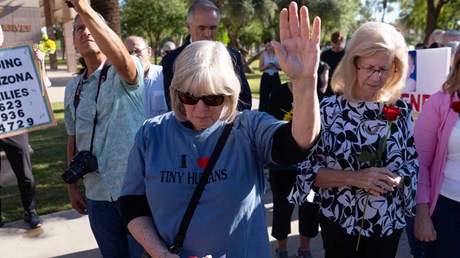 Rosie Villegas-Smith was spending a Saturday handing out flyers with volunteers from Voces Unidas, a pro-life nonprofit, when she noticed a group gathering signatures.The woman who approached her never mentioned the word abortion, only referring to women’s rights, but she quickly realized what they were campaigning for: a ballot measure on expanding abortion access in Arizona in the November elections.The southwestern state is one of up to a dozen across the country that will vote on abortion later this year, part of the continued reshaping of the legal landscape following the reversal of Roe v. Wade.Arizona’s measure would enshrine the right to an abortion in the state’s constitution, overriding its current 15-week ban and allowing the procedure at any point in a pregnancy if a health care provider determines it is necessary to protect either the life or the physical and mental health of the mother.The state has been in a back-and-forth over abortion policies for weeks, with pro-life groups ramping up efforts to reach out to women who may be considering abortions and to voters who may consider supporting expanding abortion access.Last month, Arizona’s top court ruled that an 1864 law prohibiting abortion could go into effect as a result of the reversal of Roe v. Wade. The controversial ruling came under fire nationally; even former president Donald Trump and other high-profile Republicans suggested it went too far. Vice President Kamala Harris slammed the law as putting women in a “state of chaos and cruelty caused by Donald Trump.”A legislative repeal narrowly passed the state Senate 16–14 after two Republicans crossed the aisle to side with Democrats. ...Continue reading... Rosie Villegas-Smith was spending a Saturday handing out flyers with volunteers from Voces Unidas, a pro-life nonprofit, when she noticed a group gathering signatures.The woman who approached her never mentioned the word abortion, only referring to women’s rights, but she quickly realized what they were campaigning for: a ballot measure on expanding abortion access in Arizona in the November elections.The southwestern state is one of up to a dozen across the country that will vote on abortion later this year, part of the continued reshaping of the legal landscape following the reversal of Roe v. Wade.Arizona’s measure would enshrine the right to an abortion in the state’s constitution, overriding its current 15-week ban and allowing the procedure at any point in a pregnancy if a health care provider determines it is necessary to protect either the life or the physical and mental health of the mother.The state has been in a back-and-forth over abortion policies for weeks, with pro-life groups ramping up efforts to reach out to women who may be considering abortions and to voters who may consider supporting expanding abortion access.Last month, Arizona’s top court ruled that an 1864 law prohibiting abortion could go into effect as a result of the reversal of Roe v. Wade. The controversial ruling came under fire nationally; even former president Donald Trump and other high-profile Republicans suggested it went too far. Vice President Kamala Harris slammed the law as putting women in a “state of chaos and cruelty caused by Donald Trump.”A legislative repeal narrowly passed the state Senate 16–14 after two Republicans crossed the aisle to side with Democrats. ...Continue reading... |
One of the founding leaders of Victory megachurch, he never stopped running to share the gospel.
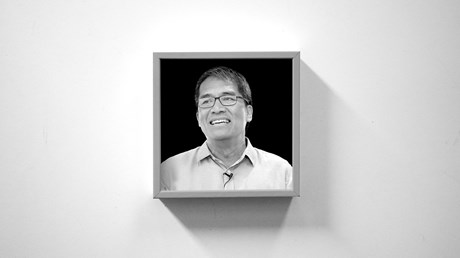 Ferdinand “Ferdie” Cabiling, a bishop at one of the Philippines’ largest megachurches who ran across the Philippines to raise money for disadvantaged students, died April 1, the day after Easter. He was 58 years old.Dubbed “the Running Pastor,” the moniker describes not only Cabiling’s epic race but how he lived his life and served as an evangelist. For 38 years, he was a vocational minister of Victory Christian Fellowship of the Philippines, which has nearly 150 locations in the country. The branch he led, Victory Metro Manila, averaged more than 75,000 people each Sunday. [Note: The author is a member of Victory Church and was a part of the late pastor's small group in 2014.]In the past two years, his focus was on teaching evangelism to Victory leaders. Every time he received a teaching invitation, his answer was always yes, said his assistant, Faye Bonifacio.“He was a maximizer,” Bonifacio said, noting that Cabiling developed a habit of taking short naps while parked at a gas station between long drives. “Because he liked to drive, he did a lot in a day.”Hours before his death, Cabiling had visited a church member at a hospital an hour away from his hometown of Cuyapo before parking his car at a gas station, likely for a break before heading to his next destination. It was there that an attendant found his lifeless body and rushed him to the hospital he had just visited. Cabiling had died of a heart attack.“He was a serious man of passion, action, and conviction,” wrote Steve Murrell, the founding pastor of Victory, the flagship church for the charismatic-leaning Every Nation Churches and Ministries, which has churches and campus ministries in ...Continue reading... Ferdinand “Ferdie” Cabiling, a bishop at one of the Philippines’ largest megachurches who ran across the Philippines to raise money for disadvantaged students, died April 1, the day after Easter. He was 58 years old.Dubbed “the Running Pastor,” the moniker describes not only Cabiling’s epic race but how he lived his life and served as an evangelist. For 38 years, he was a vocational minister of Victory Christian Fellowship of the Philippines, which has nearly 150 locations in the country. The branch he led, Victory Metro Manila, averaged more than 75,000 people each Sunday. [Note: The author is a member of Victory Church and was a part of the late pastor's small group in 2014.]In the past two years, his focus was on teaching evangelism to Victory leaders. Every time he received a teaching invitation, his answer was always yes, said his assistant, Faye Bonifacio.“He was a maximizer,” Bonifacio said, noting that Cabiling developed a habit of taking short naps while parked at a gas station between long drives. “Because he liked to drive, he did a lot in a day.”Hours before his death, Cabiling had visited a church member at a hospital an hour away from his hometown of Cuyapo before parking his car at a gas station, likely for a break before heading to his next destination. It was there that an attendant found his lifeless body and rushed him to the hospital he had just visited. Cabiling had died of a heart attack.“He was a serious man of passion, action, and conviction,” wrote Steve Murrell, the founding pastor of Victory, the flagship church for the charismatic-leaning Every Nation Churches and Ministries, which has churches and campus ministries in ...Continue reading... |
The popular series about Jesus is now available in 50 languages with plans for 550 more.
 The film was familiar but the language was new for Come and See CEO Stan Jantz.As he sat in a theater in Warsaw, he looked around the room and saw people laughing and crying in the same places he had laughed and cried when he watched The Chosen, the popular streaming series that tells the story of Jesus through the eyes of the disciples. That was the moment of truth for Jantz. The real test for a translation—going beyond accuracy alone—is whether it connects with human hearts.“Translation also has to be beautiful,” Jantz told CT. “It’s an art as much as it is a science.”Come and See has dubbed or subtitled The Chosen into 50 languages so far. The group has plans to do the same for 550 more languages.No TV show has ever been translated into that many languages. Few shows are dubbed more than a handful of times, even in an era where viewership of translated programs has dramatically increased, thanks to streaming services’ global business plans. Netflix can dub shows into about three dozen languages but mostly works in French, German, Polish, Italian, Turkish, Castilian Spanish, Latin American Spanish, and Brazilian Portuguese. Some very popular shows are remade in another language, like Suits, which has Japanese, Korean, and Mongolian versions.Baywatch, starring David Hasselhoff and Pamela Anderson, has been translated 34 times. That was the record, until Come and See started turning out dubbed versions of The Chosen. There’s not a lot of profit in dubbing, so for-profit efforts will only go so far. A nonprofit like Come and See can do more.The group wants to reach 1 billion people with the show, so The Chosen can connect people to Jesus and bring them to faith. Come and ...Continue reading... The film was familiar but the language was new for Come and See CEO Stan Jantz.As he sat in a theater in Warsaw, he looked around the room and saw people laughing and crying in the same places he had laughed and cried when he watched The Chosen, the popular streaming series that tells the story of Jesus through the eyes of the disciples. That was the moment of truth for Jantz. The real test for a translation—going beyond accuracy alone—is whether it connects with human hearts.“Translation also has to be beautiful,” Jantz told CT. “It’s an art as much as it is a science.”Come and See has dubbed or subtitled The Chosen into 50 languages so far. The group has plans to do the same for 550 more languages.No TV show has ever been translated into that many languages. Few shows are dubbed more than a handful of times, even in an era where viewership of translated programs has dramatically increased, thanks to streaming services’ global business plans. Netflix can dub shows into about three dozen languages but mostly works in French, German, Polish, Italian, Turkish, Castilian Spanish, Latin American Spanish, and Brazilian Portuguese. Some very popular shows are remade in another language, like Suits, which has Japanese, Korean, and Mongolian versions.Baywatch, starring David Hasselhoff and Pamela Anderson, has been translated 34 times. That was the record, until Come and See started turning out dubbed versions of The Chosen. There’s not a lot of profit in dubbing, so for-profit efforts will only go so far. A nonprofit like Come and See can do more.The group wants to reach 1 billion people with the show, so The Chosen can connect people to Jesus and bring them to faith. Come and ...Continue reading... |
Federal prosecutors are trying to prove that Bill Hwang committed massive market manipulation through his investment firm Archegos. His defense says he was trading like anyone else on Wall Street.
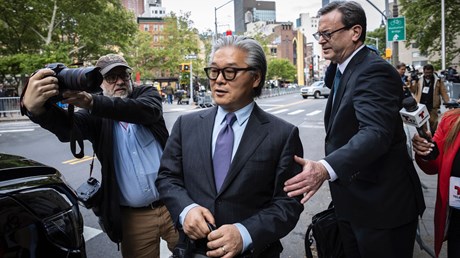 Bill Hwang brought a book by Dietrich Bonhoeffer to court to read during jury selection.And during opening arguments on Monday, his Christian connections from New York packed out a courtroom to support him.He had given his investment firm a Christian name, held Wall Street Bible readings, and distributed millions to evangelical charities.But federal prosecutors at Hwang’s highly anticipated criminal trial are accusing the billionaire of being a mob boss mastermind rather than a humble evangelical investor following his convictions.Hwang has been charged with tens of billions of dollars’ worth of securities fraud. In a packed courtroom in lower Manhattan on Monday, the prosecution claimed his investment firm Archegos Capital Management was an “organized criminal enterprise,” like a mob operation. Hwang faces decades in prison.The blockbuster trial is expected to last eight weeks and will include witnesses from the Christian world in New York. Andy Mills, the former president of The King’s College, who also served as CEO of Archegos and as chairman of Hwang’s foundation, will testify for the defense.Hwang and his wife, Becky Hwang, are the sole backers of the $528 million Grace and Mercy Foundation, which supports ministries in New York and around the world.Many of Hwang’s former employees at Archegos are Christians—like Jensen Ko, who, after the collapse of Archegos, started a new investment fund called AriseN. And Archegos was named for a Greek word used to describe Christ as the “author” of our salvation (Heb. 2:10) and the “prince” of life (Acts 3:15).Archegos fell apart in March 2021. It bought up massive positions in a few companies using borrowed ...Continue reading... Bill Hwang brought a book by Dietrich Bonhoeffer to court to read during jury selection.And during opening arguments on Monday, his Christian connections from New York packed out a courtroom to support him.He had given his investment firm a Christian name, held Wall Street Bible readings, and distributed millions to evangelical charities.But federal prosecutors at Hwang’s highly anticipated criminal trial are accusing the billionaire of being a mob boss mastermind rather than a humble evangelical investor following his convictions.Hwang has been charged with tens of billions of dollars’ worth of securities fraud. In a packed courtroom in lower Manhattan on Monday, the prosecution claimed his investment firm Archegos Capital Management was an “organized criminal enterprise,” like a mob operation. Hwang faces decades in prison.The blockbuster trial is expected to last eight weeks and will include witnesses from the Christian world in New York. Andy Mills, the former president of The King’s College, who also served as CEO of Archegos and as chairman of Hwang’s foundation, will testify for the defense.Hwang and his wife, Becky Hwang, are the sole backers of the $528 million Grace and Mercy Foundation, which supports ministries in New York and around the world.Many of Hwang’s former employees at Archegos are Christians—like Jensen Ko, who, after the collapse of Archegos, started a new investment fund called AriseN. And Archegos was named for a Greek word used to describe Christ as the “author” of our salvation (Heb. 2:10) and the “prince” of life (Acts 3:15).Archegos fell apart in March 2021. It bought up massive positions in a few companies using borrowed ...Continue reading... |
From 1978 to 2008, he fought for legal recognition and freedom to worship for the Anabaptist denomination.
 Nguyen Quang Trung spent 30 years trying to get the Mennonite church recognized and registered by the government of Vietnam so that believers could meet and worship legally. When he finally succeeded, he celebrated the triumph with the words of the apostle Paul: “If we live, we live for the Lord; and if we die, we die for the Lord. So, whether we live or die, we belong to the Lord” (Rom. 14:8).Nguyen, a pastor and two-time president of Hội Thánh Mennonite Việt Nam (Vietnam Mennonite Church), died on March 23 at age 84. He was known for his “patient persistence” and “tireless efforts to promote and legally confirm a Mennonite presence in Vietnam,” Gerry Keener, former head of Eastern Mennonite Missions, told Anabaptist World.Nguyen was born in Gia Dinh, an industrial area outside Saigon. His mother died when he was five. His father was a committed Christian who raised him in the Evangelical Church of Vietnam, part of the Christian and Missionary Alliance.In his 20s, Nguyen found himself drawn to the Mennonites, spending a lot of time in a reading room established by the Eastern Mennonite Board of Missions and Charities. He took classes on English and the Bible and learned the Anabaptist teachings about nonviolence.“The same Spirit that empowered Jesus also empowers us to love enemies,” the missionaries taught Nguyen, “to forgive rather than to seek revenge, to practice right relationships, to rely on the community of faith to settle disputes, and to resist evil without violence.”Nguyen embraced the idea that Christians should “follow Christ in the way of peace” and practice “nonresistance,” even if they faced persecution and death.The ...Continue reading... Nguyen Quang Trung spent 30 years trying to get the Mennonite church recognized and registered by the government of Vietnam so that believers could meet and worship legally. When he finally succeeded, he celebrated the triumph with the words of the apostle Paul: “If we live, we live for the Lord; and if we die, we die for the Lord. So, whether we live or die, we belong to the Lord” (Rom. 14:8).Nguyen, a pastor and two-time president of Hội Thánh Mennonite Việt Nam (Vietnam Mennonite Church), died on March 23 at age 84. He was known for his “patient persistence” and “tireless efforts to promote and legally confirm a Mennonite presence in Vietnam,” Gerry Keener, former head of Eastern Mennonite Missions, told Anabaptist World.Nguyen was born in Gia Dinh, an industrial area outside Saigon. His mother died when he was five. His father was a committed Christian who raised him in the Evangelical Church of Vietnam, part of the Christian and Missionary Alliance.In his 20s, Nguyen found himself drawn to the Mennonites, spending a lot of time in a reading room established by the Eastern Mennonite Board of Missions and Charities. He took classes on English and the Bible and learned the Anabaptist teachings about nonviolence.“The same Spirit that empowered Jesus also empowers us to love enemies,” the missionaries taught Nguyen, “to forgive rather than to seek revenge, to practice right relationships, to rely on the community of faith to settle disputes, and to resist evil without violence.”Nguyen embraced the idea that Christians should “follow Christ in the way of peace” and practice “nonresistance,” even if they faced persecution and death.The ...Continue reading... |
The Uniform Civil Code seeks “one nation, one law” to govern citizens' personal lives, but religious minorities fear hidden costs.
 In February, the northern Indian state of Uttarakhand passed a Uniform Civil Code (UCC), which aims to implement a common set of rules governing crucial aspects of life, including marriage, divorce, inheritance, and adoption.This code would supplant existing personal laws that religious groups in India currently ascribe to. Personal laws cover family-related matters such as marriage, divorce, child custody, adoption, property rights, and inheritance.If the ruling Hindu-led Bharatiya Janata Party (BJP) has its way, a UCC will eventually be implemented across all of India. (At present, Goa is the only other state with a UCC, derived from the Portuguese-era Civil Code of 1867.)The BJP’s push to implement a national UCC may bring relief for Christians in India, especially in terms of women’s inheritance rights. Under existing personal laws, Christian mothers cannot inherit their deceased children’s property. The UCC proposes to eliminate discriminatory provisions that favor male inheritance, potentially leading to more equitable inheritance rights for Christian women.But few of India’s religious minorities trust the BJP, whose policies have often been more harmful than helpful to Christian communities. In Assam, Christian leaders protested the passing of a bill banning “magical healing” as it unfairly impacted their custom of praying for the sick. Ministries including World Vision and the Evangelical Fellowship of India recently lost government authorization to collect foreign donations. Nine states now have anti-conversion laws in place, and believers have borne the brunt of religious unrest in these areas as a result.As this year’s general elections seem likely ...Continue reading... In February, the northern Indian state of Uttarakhand passed a Uniform Civil Code (UCC), which aims to implement a common set of rules governing crucial aspects of life, including marriage, divorce, inheritance, and adoption.This code would supplant existing personal laws that religious groups in India currently ascribe to. Personal laws cover family-related matters such as marriage, divorce, child custody, adoption, property rights, and inheritance.If the ruling Hindu-led Bharatiya Janata Party (BJP) has its way, a UCC will eventually be implemented across all of India. (At present, Goa is the only other state with a UCC, derived from the Portuguese-era Civil Code of 1867.)The BJP’s push to implement a national UCC may bring relief for Christians in India, especially in terms of women’s inheritance rights. Under existing personal laws, Christian mothers cannot inherit their deceased children’s property. The UCC proposes to eliminate discriminatory provisions that favor male inheritance, potentially leading to more equitable inheritance rights for Christian women.But few of India’s religious minorities trust the BJP, whose policies have often been more harmful than helpful to Christian communities. In Assam, Christian leaders protested the passing of a bill banning “magical healing” as it unfairly impacted their custom of praying for the sick. Ministries including World Vision and the Evangelical Fellowship of India recently lost government authorization to collect foreign donations. Nine states now have anti-conversion laws in place, and believers have borne the brunt of religious unrest in these areas as a result.As this year’s general elections seem likely ...Continue reading... |
A first cohort of scholars consider whether God is calling them to executive leadership.
 Ted Song wears many hats.He is the chief innovation and intercultural engagement officer at John Brown University and the head of the engineering department at the evangelical school in Northwest Arkansas. He’s a dad to three daughters, an elder and college minister at his church, and a student earning a law degree to learn more about the rules and regulations governing higher education.Song also has his eye on another potential hat.Last year, he joined the first cohort of presidential fellows at the Council for Christian Colleges and Universities (CCCU), exploring a call to lead an evangelical school.“If presidency is God’s calling, great,” Song said. “If God wants to use a person as a president of a Christian college, great. But that can also happen in the classroom or on an athletic field. I want to remind myself and also remind my students that we always need to go back to our mission.”Song is one of three evangelical academics who have joined the CCCU’s yearlong program to prepare for the possibility of becoming a Christian college president. The other two members of the inaugural group are Keith Hall, vice president for student belonging at Azusa Pacific University, and Sarah Visser, executive vice president for student experience and strategy at Calvin University.“Each one of these fellows is outstanding,” said Shirley Hoogstra, president of the CCCU. “There’s always turnover in senior leadership, and we want to make sure that we are equipping groups of people to be available for those positions … to be ready in the event that a call comes from God to move into the next level of leadership.”The presidential training program launched in ...Continue reading... Ted Song wears many hats.He is the chief innovation and intercultural engagement officer at John Brown University and the head of the engineering department at the evangelical school in Northwest Arkansas. He’s a dad to three daughters, an elder and college minister at his church, and a student earning a law degree to learn more about the rules and regulations governing higher education.Song also has his eye on another potential hat.Last year, he joined the first cohort of presidential fellows at the Council for Christian Colleges and Universities (CCCU), exploring a call to lead an evangelical school.“If presidency is God’s calling, great,” Song said. “If God wants to use a person as a president of a Christian college, great. But that can also happen in the classroom or on an athletic field. I want to remind myself and also remind my students that we always need to go back to our mission.”Song is one of three evangelical academics who have joined the CCCU’s yearlong program to prepare for the possibility of becoming a Christian college president. The other two members of the inaugural group are Keith Hall, vice president for student belonging at Azusa Pacific University, and Sarah Visser, executive vice president for student experience and strategy at Calvin University.“Each one of these fellows is outstanding,” said Shirley Hoogstra, president of the CCCU. “There’s always turnover in senior leadership, and we want to make sure that we are equipping groups of people to be available for those positions … to be ready in the event that a call comes from God to move into the next level of leadership.”The presidential training program launched in ...Continue reading... |
The popular series about Jesus is now available in 50 languages with plans for 550 more.
 The film was familiar but the language was new for Come and See CEO Stan Jantz.As he sat in a theater in Warsaw, he looked around the room and saw people laughing and crying in the same places he had laughed and cried when he watched The Chosen, the popular streaming series that tells the story of Jesus through the eyes of the disciples. That was the moment of truth for Jantz. The real test for a translation—going beyond accuracy alone—is whether it connects with human hearts.“Translation also has to be beautiful,” Jantz told CT. “It’s an art as much as it is a science.”Come and See has dubbed or subtitled The Chosen into 50 languages so far. The group has plans to do the same for 550 more languages.No TV show has ever been translated into that many languages. Few shows are dubbed more than a handful of times, even in an era where viewership of translated programs has dramatically increased, thanks to streaming services’ global business plans. Netflix can dub shows into about three dozen languages but mostly works in French, German, Polish, Italian, Turkish, Castilian Spanish, Latin American Spanish, and Brazilian Portuguese. Some very popular shows are remade in another language, like Suits, which has Japanese, Korean, and Mongolian versions.Baywatch, starring David Hasselhoff and Pamela Anderson, has been translated 34 times. That was the record, until Come and See started turning out dubbed versions of The Chosen. There’s not a lot of profit in dubbing, so for-profit efforts will only go so far. A nonprofit like Come and See can do more.The group wants to reach 1 billion people with the show, so The Chosen can connect people to Jesus and bring them to faith. Come and ...Continue reading... The film was familiar but the language was new for Come and See CEO Stan Jantz.As he sat in a theater in Warsaw, he looked around the room and saw people laughing and crying in the same places he had laughed and cried when he watched The Chosen, the popular streaming series that tells the story of Jesus through the eyes of the disciples. That was the moment of truth for Jantz. The real test for a translation—going beyond accuracy alone—is whether it connects with human hearts.“Translation also has to be beautiful,” Jantz told CT. “It’s an art as much as it is a science.”Come and See has dubbed or subtitled The Chosen into 50 languages so far. The group has plans to do the same for 550 more languages.No TV show has ever been translated into that many languages. Few shows are dubbed more than a handful of times, even in an era where viewership of translated programs has dramatically increased, thanks to streaming services’ global business plans. Netflix can dub shows into about three dozen languages but mostly works in French, German, Polish, Italian, Turkish, Castilian Spanish, Latin American Spanish, and Brazilian Portuguese. Some very popular shows are remade in another language, like Suits, which has Japanese, Korean, and Mongolian versions.Baywatch, starring David Hasselhoff and Pamela Anderson, has been translated 34 times. That was the record, until Come and See started turning out dubbed versions of The Chosen. There’s not a lot of profit in dubbing, so for-profit efforts will only go so far. A nonprofit like Come and See can do more.The group wants to reach 1 billion people with the show, so The Chosen can connect people to Jesus and bring them to faith. Come and ...Continue reading... |
The Uniform Civil Code seeks "one nation, one law" to govern citizens' personal lives, but religious minorities fear hidden costs.
 In February, the northern Indian state of Uttarakhand passed a Uniform Civil Code (UCC), which aims to implement a common set of rules governing crucial aspects of life, including marriage, divorce, inheritance, and adoption.This code would supplant existing personal laws that religious groups in India currently ascribe to. Personal laws cover family-related matters such as marriage, divorce, child custody, adoption, property rights, and inheritance.If the ruling Hindu-led Bharatiya Janata Party (BJP) has its way, a UCC will eventually be implemented across all of India. (At present, Goa is the only other state with a UCC, derived from the Portuguese-era Civil Code of 1867.)The BJP’s push to implement a national UCC may bring relief for Christians in India, especially in terms of women’s inheritance rights. Under existing personal laws, Christian mothers cannot inherit their deceased children’s property. The UCC proposes to eliminate discriminatory provisions that favor male inheritance, potentially leading to more equitable inheritance rights for Christian women.But few of India’s religious minorities trust the BJP, whose policies have often been more harmful than helpful to Christian communities. In Assam, Christian leaders protested the passing of a bill banning “magical healing” as it unfairly impacted their custom of praying for the sick. Ministries including World Vision and the Evangelical Fellowship of India recently lost government authorization to collect foreign donations. Nine states now have anti-conversion laws in place, and believers have borne the brunt of religious unrest in these areas as a result.As this year’s general elections seem likely ...Continue reading... In February, the northern Indian state of Uttarakhand passed a Uniform Civil Code (UCC), which aims to implement a common set of rules governing crucial aspects of life, including marriage, divorce, inheritance, and adoption.This code would supplant existing personal laws that religious groups in India currently ascribe to. Personal laws cover family-related matters such as marriage, divorce, child custody, adoption, property rights, and inheritance.If the ruling Hindu-led Bharatiya Janata Party (BJP) has its way, a UCC will eventually be implemented across all of India. (At present, Goa is the only other state with a UCC, derived from the Portuguese-era Civil Code of 1867.)The BJP’s push to implement a national UCC may bring relief for Christians in India, especially in terms of women’s inheritance rights. Under existing personal laws, Christian mothers cannot inherit their deceased children’s property. The UCC proposes to eliminate discriminatory provisions that favor male inheritance, potentially leading to more equitable inheritance rights for Christian women.But few of India’s religious minorities trust the BJP, whose policies have often been more harmful than helpful to Christian communities. In Assam, Christian leaders protested the passing of a bill banning “magical healing” as it unfairly impacted their custom of praying for the sick. Ministries including World Vision and the Evangelical Fellowship of India recently lost government authorization to collect foreign donations. Nine states now have anti-conversion laws in place, and believers have borne the brunt of religious unrest in these areas as a result.As this year’s general elections seem likely ...Continue reading... |
It wasn't only because of missionaries from the West, says a Tongan Australian theologian.
 Christian overseas missionaries were more successful in Oceania—the region spanning the Pacific Islands, Australia, Papua New Guinea, and New Zealand—than anywhere else in the world.In particular, people in the Pacific Islands (which include Fiji, Papua New Guinea, Samoa, Vanuatu, Tonga, and more) were receptive to the gospel because “their ancestors’ strong beliefs in a divine presence and in the afterlife made them very open to Christian faith,” wrote Jacqueline Ryle, a contributor to the 2021 reference volume Christianity in Oceania. Tongan Australian theologian Katalina Tahaafe-Williams says her research reveals the same: The growth of Christianity in the region was not because of white Europeans but rather due to Indigenous missionaries who translated Christianity in a way that made sense to locals.Tahaafe-Williams, who lives in Sydney, served as the Indigenous coeditor for the book alongside prominent global Christianity scholars Kenneth R. Ross and Todd M. Johnson.“Our goal was to recruit Indigenous writers from all over the region to contribute to this volume,” she explained. “It was my task to connect with potential authors, theologians, leaders, and church members from the Pacific Islands … we were very committed to finding, however challenging it might be, authors who were part of that particular culture, thereby making the work very authentic.”CT Global books editor Geethanjali Tupps spoke with Tahaafe-Williams on why Christianity flourished in the Pacific Islands, how migration patterns have impacted the church, and why the region shouldn’t serve as the poster child for climate change issues.Continue reading... Christian overseas missionaries were more successful in Oceania—the region spanning the Pacific Islands, Australia, Papua New Guinea, and New Zealand—than anywhere else in the world.In particular, people in the Pacific Islands (which include Fiji, Papua New Guinea, Samoa, Vanuatu, Tonga, and more) were receptive to the gospel because “their ancestors’ strong beliefs in a divine presence and in the afterlife made them very open to Christian faith,” wrote Jacqueline Ryle, a contributor to the 2021 reference volume Christianity in Oceania. Tongan Australian theologian Katalina Tahaafe-Williams says her research reveals the same: The growth of Christianity in the region was not because of white Europeans but rather due to Indigenous missionaries who translated Christianity in a way that made sense to locals.Tahaafe-Williams, who lives in Sydney, served as the Indigenous coeditor for the book alongside prominent global Christianity scholars Kenneth R. Ross and Todd M. Johnson.“Our goal was to recruit Indigenous writers from all over the region to contribute to this volume,” she explained. “It was my task to connect with potential authors, theologians, leaders, and church members from the Pacific Islands … we were very committed to finding, however challenging it might be, authors who were part of that particular culture, thereby making the work very authentic.”CT Global books editor Geethanjali Tupps spoke with Tahaafe-Williams on why Christianity flourished in the Pacific Islands, how migration patterns have impacted the church, and why the region shouldn’t serve as the poster child for climate change issues.Continue reading... |
A majority of American Protestants were raised by devout mothers, a study finds.
 The vast majority of American Christians were raised in the faith—and most can point to the influence of their moms.In a 2023 study, the American Bible Society found that a majority of believers remain in the same religious tradition as their mothers. This agrees with a large body of mainstream social science research dating back to the 1970s that says the active faith of mothers is a strong predictor of religious transmission.Some of this may be attributed to the natural bond children have with their mothers. But there is also research that shows that moms take a more active role in faith formation in America.A 2019 Barna Group survey found that Christian teenagers who say their faith is very important to them are 20 points more likely to talk to their moms about religion than their dads. More than 70 percent of Christian teenagers read the Bible, 70 percent talk about God, and 63 percent pray with their moms.Continue reading... The vast majority of American Christians were raised in the faith—and most can point to the influence of their moms.In a 2023 study, the American Bible Society found that a majority of believers remain in the same religious tradition as their mothers. This agrees with a large body of mainstream social science research dating back to the 1970s that says the active faith of mothers is a strong predictor of religious transmission.Some of this may be attributed to the natural bond children have with their mothers. But there is also research that shows that moms take a more active role in faith formation in America.A 2019 Barna Group survey found that Christian teenagers who say their faith is very important to them are 20 points more likely to talk to their moms about religion than their dads. More than 70 percent of Christian teenagers read the Bible, 70 percent talk about God, and 63 percent pray with their moms.Continue reading... |
The champion of “native missions” trained more than 100,000 evangelists but got in trouble for financial mismanagement.
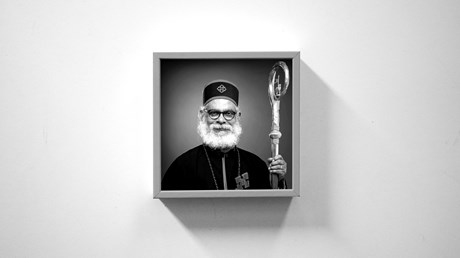 Athanasius Yohannan, who built one of the world’s largest mission organizations on the idea that Western Christians should support “native missionaries” but got in trouble for financial irregularities and dishonest fundraising, died on May 8. He was 74 and got hit by a car while walking along the road near his ministry headquarters in Texas.Born Kadapilaril Punnoose Yohannan and known for most of his ministry as K. P., Yohannan founded Gospel for Asia in 1979. Over the next 45 years, the organization trained more than 100,000 people to preach the gospel and plant and pastor churches in India, Bangladesh, Nepal, Sri Lanka, and other places in Southeast Asia, according to a recent ministry report. Gospel for Asia raised as much as $93 million in a year and in 2005 reported it was supporting about 14,500 indigenous evangelists and pastors in same-culture and near-culture ministry. Christians in the US were asked to give $30 per month to support them.“If we evangelize the world’s lost billions … it will be through native missions,” Yohannan wrote for CT. “The native missionary is far more effective than the expatriate. The national already knows the language and is already part of the culture. In many instances, he or she can go places where outsiders cannot go.”Yohannan’s death was mourned by Gospel for Asia, the church that he started and served as metropolitan bishop, and prominent political leaders in India.“He will be remembered for his service to society and emphasis on improving the quality of life of the downtrodden,” Prime Minister Narendra Modi wrote on social media. “May his soul rest in peace.”Both the governor of Kerala and the ...Continue reading... Athanasius Yohannan, who built one of the world’s largest mission organizations on the idea that Western Christians should support “native missionaries” but got in trouble for financial irregularities and dishonest fundraising, died on May 8. He was 74 and got hit by a car while walking along the road near his ministry headquarters in Texas.Born Kadapilaril Punnoose Yohannan and known for most of his ministry as K. P., Yohannan founded Gospel for Asia in 1979. Over the next 45 years, the organization trained more than 100,000 people to preach the gospel and plant and pastor churches in India, Bangladesh, Nepal, Sri Lanka, and other places in Southeast Asia, according to a recent ministry report. Gospel for Asia raised as much as $93 million in a year and in 2005 reported it was supporting about 14,500 indigenous evangelists and pastors in same-culture and near-culture ministry. Christians in the US were asked to give $30 per month to support them.“If we evangelize the world’s lost billions … it will be through native missions,” Yohannan wrote for CT. “The native missionary is far more effective than the expatriate. The national already knows the language and is already part of the culture. In many instances, he or she can go places where outsiders cannot go.”Yohannan’s death was mourned by Gospel for Asia, the church that he started and served as metropolitan bishop, and prominent political leaders in India.“He will be remembered for his service to society and emphasis on improving the quality of life of the downtrodden,” Prime Minister Narendra Modi wrote on social media. “May his soul rest in peace.”Both the governor of Kerala and the ...Continue reading... |
In the country's most secular state, tiny congregations have made a big impact by their disaster response.
 For weeks, Tárik Rodriguez had been working on bringing a guest preacher and worship leader from across the country to help his church celebrate its third anniversary. In 2021, Rodriguez and a small team launched Viela da Graça Igreja in Novo Hamburgo, a small city in Brazil’s most southern province, Rio Grande do Sul.Then, it started raining.The floods have done more than interrupt the small Reformed congregation’s celebratory plans. They’ve devastated the community. The storms that began at the end of April struck Rio Grande do Sul’s most densely populated areas and have killed at least 116 people. Around 130 people are still missing. The high water has closed roads and even the airport, which has grounded flights until May 30. As of Friday, May 10, nearly 400,000 people have been displaced from their homes and 70,772 are in public shelters.Some of those have found their way to Viela da Graça, which is located on higher ground and has been largely protected from a water breach. Since May 4, Rodriguez and members of the 75-person congregation have been hosting around 50 people in a two-bathroom, 3,500-square-foot building.“As Christians, we needed to open our doors,” Rodriguez says. “And that’s what we did.”Beyond the bathroom constraints, the situation has been less than ideal. There are frequent power cuts (1.2 million people have been affected by outages) and the building has lost access to both running and potable water because the sanitation company cannot treat the dirty floodwaters. A nearby residential condominium, which gets its water from a well, has provided drinking water and showers.Continue reading... For weeks, Tárik Rodriguez had been working on bringing a guest preacher and worship leader from across the country to help his church celebrate its third anniversary. In 2021, Rodriguez and a small team launched Viela da Graça Igreja in Novo Hamburgo, a small city in Brazil’s most southern province, Rio Grande do Sul.Then, it started raining.The floods have done more than interrupt the small Reformed congregation’s celebratory plans. They’ve devastated the community. The storms that began at the end of April struck Rio Grande do Sul’s most densely populated areas and have killed at least 116 people. Around 130 people are still missing. The high water has closed roads and even the airport, which has grounded flights until May 30. As of Friday, May 10, nearly 400,000 people have been displaced from their homes and 70,772 are in public shelters.Some of those have found their way to Viela da Graça, which is located on higher ground and has been largely protected from a water breach. Since May 4, Rodriguez and members of the 75-person congregation have been hosting around 50 people in a two-bathroom, 3,500-square-foot building.“As Christians, we needed to open our doors,” Rodriguez says. “And that’s what we did.”Beyond the bathroom constraints, the situation has been less than ideal. There are frequent power cuts (1.2 million people have been affected by outages) and the building has lost access to both running and potable water because the sanitation company cannot treat the dirty floodwaters. A nearby residential condominium, which gets its water from a well, has provided drinking water and showers.Continue reading... |
One of the founding leaders of Victory megachurch, he never stopped running to share the gospel.
 Ferdinand “Ferdie” Cabiling, a bishop at one of the Philippines’ largest megachurches who ran across the Philippines to raise money for disadvantaged students, died April 1, the day after Easter. He was 58 years old.Dubbed “the Running Pastor,” the moniker describes not only Cabiling’s epic race but how he lived his life and served as an evangelist. For 38 years, he was a vocational minister of Victory Christian Fellowship of the Philippines, which has nearly 150 locations in the country. The branch he led, Victory Metro Manila, averaged more than 75,000 people each Sunday. [Note: The author is a member of Victory Church and was a part of the late pastor's small group in 2014.]In the past two years, his focus was on teaching evangelism to Victory leaders. Every time he received a teaching invitation, his answer was always yes, said his assistant, Faye Bonifacio.“He was a maximizer,” Bonifacio said, noting that Cabiling developed a habit of taking short naps while parked at a gas station between long drives. “Because he liked to drive, he did a lot in a day.”Hours before his death, Cabiling had visited a church member at a hospital an hour away from his hometown of Cuyapo before parking his car at a gas station, likely for a break before heading to his next destination. It was there that an attendant found his lifeless body and rushed him to the hospital he had just visited. Cabiling had died of a heart attack.“He was a serious man of passion, action, and conviction,” wrote Steve Murrell, the founding pastor of Victory, the flagship church for the charismatic-leaning Every Nation Churches and Ministries, which has churches and campus ministries in ...Continue reading... Ferdinand “Ferdie” Cabiling, a bishop at one of the Philippines’ largest megachurches who ran across the Philippines to raise money for disadvantaged students, died April 1, the day after Easter. He was 58 years old.Dubbed “the Running Pastor,” the moniker describes not only Cabiling’s epic race but how he lived his life and served as an evangelist. For 38 years, he was a vocational minister of Victory Christian Fellowship of the Philippines, which has nearly 150 locations in the country. The branch he led, Victory Metro Manila, averaged more than 75,000 people each Sunday. [Note: The author is a member of Victory Church and was a part of the late pastor's small group in 2014.]In the past two years, his focus was on teaching evangelism to Victory leaders. Every time he received a teaching invitation, his answer was always yes, said his assistant, Faye Bonifacio.“He was a maximizer,” Bonifacio said, noting that Cabiling developed a habit of taking short naps while parked at a gas station between long drives. “Because he liked to drive, he did a lot in a day.”Hours before his death, Cabiling had visited a church member at a hospital an hour away from his hometown of Cuyapo before parking his car at a gas station, likely for a break before heading to his next destination. It was there that an attendant found his lifeless body and rushed him to the hospital he had just visited. Cabiling had died of a heart attack.“He was a serious man of passion, action, and conviction,” wrote Steve Murrell, the founding pastor of Victory, the flagship church for the charismatic-leaning Every Nation Churches and Ministries, which has churches and campus ministries in ...Continue reading... |
Matthew Warner, who had tweeted about gay marriage, is the latest in a string of Christian college faculty who have lost their jobs after being accused of theological misalignment.
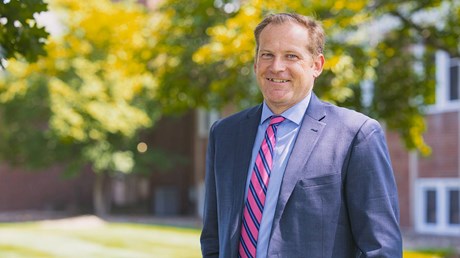 With glowing performance reviews and above-average student evaluations, by most measures Matthew Warner’s first year as a communications professor at Grace College was a triumph.But he spent most of that first year knowing it could be his last. After four months on the job, Warner was informed by the school’s president, Drew Flamm, that the board had “come to the conclusion that we don’t think it works out to move forward,” according to a recording obtained by Religion News Service.Warner’s termination is the latest in a string of professor terminations at Christian colleges seemingly tied to clashes over narrowing and often unspoken political and theological criteria.While Flamm didn’t specify the reasons for Warner’s dismissal, it was preceded by an online termination campaign clear about its goals. Launched by conservative influencers and Grace College stakeholders, the campaign demanded Warner’s removal due to his social media posts about LGBTQ rights, Black Lives Matter, and critiques of the GOP. Almost all the posts predated Warner’s employment at the college.Grace College declined to answer questions about Warner, saying it was a personnel matter. “Dr. Matt Warner fulfilled his agreement for the year. Grace College wishes Dr. Warner well in his future endeavors,” Norm Bakhit, Grace College’s chief officer of human resources, told RNS in a statement. Flamm did not offer further comment.Warner and his wife said they both left behind jobs and sold their home in metro Detroit to move with their three kids to Warsaw, Indiana, for Warner’s job at Grace. It was his dream position, they said, and noted that they gave up 60 percent of their ...Continue reading... With glowing performance reviews and above-average student evaluations, by most measures Matthew Warner’s first year as a communications professor at Grace College was a triumph.But he spent most of that first year knowing it could be his last. After four months on the job, Warner was informed by the school’s president, Drew Flamm, that the board had “come to the conclusion that we don’t think it works out to move forward,” according to a recording obtained by Religion News Service.Warner’s termination is the latest in a string of professor terminations at Christian colleges seemingly tied to clashes over narrowing and often unspoken political and theological criteria.While Flamm didn’t specify the reasons for Warner’s dismissal, it was preceded by an online termination campaign clear about its goals. Launched by conservative influencers and Grace College stakeholders, the campaign demanded Warner’s removal due to his social media posts about LGBTQ rights, Black Lives Matter, and critiques of the GOP. Almost all the posts predated Warner’s employment at the college.Grace College declined to answer questions about Warner, saying it was a personnel matter. “Dr. Matt Warner fulfilled his agreement for the year. Grace College wishes Dr. Warner well in his future endeavors,” Norm Bakhit, Grace College’s chief officer of human resources, told RNS in a statement. Flamm did not offer further comment.Warner and his wife said they both left behind jobs and sold their home in metro Detroit to move with their three kids to Warsaw, Indiana, for Warner’s job at Grace. It was his dream position, they said, and noted that they gave up 60 percent of their ...Continue reading... |
The controversial iPad ad proves that technology can indeed flatten—or crush—what is real.
 A recent advertisement from Apple for the new iPad Pro has somehow managed to existentially disturb me. Titled “Crush!” it shows an ominous hydraulic press above a platform filled with symbols of humanity, creativity, and joy: a metronome, guitar, classical statue, piano, analog cameras, books, paint, and more.The metronome starts, and the press descends to Sonny & Cher’s “All I Need Is You,” slowly obliterating everything in high-def slow motion, before rising again to reveal only a “thinner than ever” iPad Pro. “Just imagine all the things it’ll be used to create,” Apple CEO Tim Cook posted on the social platform X.I am not alone in my revulsion. Actors Hugh Grant and Justine Bateman join me, as do apparently thousands of vocal people on the Internet and what appears to be the entire nation of Japan. The backlash, particularly from the “creatives” that Apple was courting for their product, was so pronounced that the company issued a rare apology, saying they had “missed the mark.”But what mark did they miss? More than missing just the tastes of their buyers, they missed the mark of reality—both of the creative process and of the goodness of the embodied nature that is essential to our humanity.I see why Apple produced the ad. There is tremendous economic incentive for tech corporations to replace previous, more embodied experiences and tools. Apple Music will never scratch like the fragile grooves of a vinyl record (also, it contains most of the recorded music in the world). GarageBand can’t go out of tune (and its digital “instruments” can mimic the entire orchestra). One can “paint” all day on ...Continue reading... A recent advertisement from Apple for the new iPad Pro has somehow managed to existentially disturb me. Titled “Crush!” it shows an ominous hydraulic press above a platform filled with symbols of humanity, creativity, and joy: a metronome, guitar, classical statue, piano, analog cameras, books, paint, and more.The metronome starts, and the press descends to Sonny & Cher’s “All I Need Is You,” slowly obliterating everything in high-def slow motion, before rising again to reveal only a “thinner than ever” iPad Pro. “Just imagine all the things it’ll be used to create,” Apple CEO Tim Cook posted on the social platform X.I am not alone in my revulsion. Actors Hugh Grant and Justine Bateman join me, as do apparently thousands of vocal people on the Internet and what appears to be the entire nation of Japan. The backlash, particularly from the “creatives” that Apple was courting for their product, was so pronounced that the company issued a rare apology, saying they had “missed the mark.”But what mark did they miss? More than missing just the tastes of their buyers, they missed the mark of reality—both of the creative process and of the goodness of the embodied nature that is essential to our humanity.I see why Apple produced the ad. There is tremendous economic incentive for tech corporations to replace previous, more embodied experiences and tools. Apple Music will never scratch like the fragile grooves of a vinyl record (also, it contains most of the recorded music in the world). GarageBand can’t go out of tune (and its digital “instruments” can mimic the entire orchestra). One can “paint” all day on ...Continue reading... |
In the country's most secular state, tiny congregations have made a big impact by their disaster response.
 For weeks, Tárik Rodriguez had been working on bringing a guest preacher and worship leader from across the country to help his church celebrate its third anniversary. In 2021, Rodriguez and a small team launched Viela da Graça Igreja in Novo Hamburgo, a small city in Brazil’s most southern province, Rio Grande do Sul.Then, it started raining.The floods have done more than interrupt the small Reformed congregation’s celebratory plans. They’ve devastated the community. The storms that began at the end of April struck Rio Grande do Sul’s most densely populated areas and have killed at least 116 people. Around 130 people are still missing. The high water has closed roads and even the airport, which has grounded flights until May 30. As of Friday, May 10, nearly 400,000 people have been displaced from their homes and 70,772 are in public shelters.Some of those have found their way to Viela da Graça, which is located on higher ground and has been largely protected from a water breach. Since May 4, Rodriguez and members of the 75-person congregation have been hosting around 50 people in a two-bathroom, 3,500-square-foot building.“As Christians, we needed to open our doors,” Rodriguez says. “And that’s what we did.”Beyond the bathroom constraints, the situation has been less than ideal. There are frequent power cuts (1.2 million people have been affected by outages) and the building has lost access to both running and potable water because the sanitation company cannot treat the dirty floodwaters. A nearby residential condominium, which gets its water from a well, has provided drinking water and showers.Continue reading... For weeks, Tárik Rodriguez had been working on bringing a guest preacher and worship leader from across the country to help his church celebrate its third anniversary. In 2021, Rodriguez and a small team launched Viela da Graça Igreja in Novo Hamburgo, a small city in Brazil’s most southern province, Rio Grande do Sul.Then, it started raining.The floods have done more than interrupt the small Reformed congregation’s celebratory plans. They’ve devastated the community. The storms that began at the end of April struck Rio Grande do Sul’s most densely populated areas and have killed at least 116 people. Around 130 people are still missing. The high water has closed roads and even the airport, which has grounded flights until May 30. As of Friday, May 10, nearly 400,000 people have been displaced from their homes and 70,772 are in public shelters.Some of those have found their way to Viela da Graça, which is located on higher ground and has been largely protected from a water breach. Since May 4, Rodriguez and members of the 75-person congregation have been hosting around 50 people in a two-bathroom, 3,500-square-foot building.“As Christians, we needed to open our doors,” Rodriguez says. “And that’s what we did.”Beyond the bathroom constraints, the situation has been less than ideal. There are frequent power cuts (1.2 million people have been affected by outages) and the building has lost access to both running and potable water because the sanitation company cannot treat the dirty floodwaters. A nearby residential condominium, which gets its water from a well, has provided drinking water and showers.Continue reading... |
Matthew Warner, who had tweeted about gay marriage, is the latest in a string of Christian college faculty who have lost their jobs after being accused of theological misalignment.
 With glowing performance reviews and above-average student evaluations, by most measures Matthew Warner’s first year as a communications professor at Grace College was a triumph.But he spent most of that first year knowing it could be his last. After four months on the job, Warner was informed by the school’s president, Drew Flamm, that the board had “come to the conclusion that we don’t think it works out to move forward,” according to a recording obtained by Religion News Service.Warner’s termination is the latest in a string of professor terminations at Christian colleges seemingly tied to clashes over narrowing and often unspoken political and theological criteria.While Flamm didn’t specify the reasons for Warner’s dismissal, it was preceded by an online termination campaign clear about its goals. Launched by conservative influencers and Grace College stakeholders, the campaign demanded Warner’s removal due to his social media posts about LGBTQ rights, Black Lives Matter, and critiques of the GOP. Almost all the posts predated Warner’s employment at the college.Grace College declined to answer questions about Warner, saying it was a personnel matter. “Dr. Matt Warner fulfilled his agreement for the year. Grace College wishes Dr. Warner well in his future endeavors,” Norm Bakhit, Grace College’s chief officer of human resources, told RNS in a statement. Flamm did not offer further comment.Warner and his wife said they both left behind jobs and sold their home in metro Detroit to move with their three kids to Warsaw, Indiana, for Warner’s job at Grace. It was his dream position, they said, and noted that they gave up 60 percent of their ...Continue reading... With glowing performance reviews and above-average student evaluations, by most measures Matthew Warner’s first year as a communications professor at Grace College was a triumph.But he spent most of that first year knowing it could be his last. After four months on the job, Warner was informed by the school’s president, Drew Flamm, that the board had “come to the conclusion that we don’t think it works out to move forward,” according to a recording obtained by Religion News Service.Warner’s termination is the latest in a string of professor terminations at Christian colleges seemingly tied to clashes over narrowing and often unspoken political and theological criteria.While Flamm didn’t specify the reasons for Warner’s dismissal, it was preceded by an online termination campaign clear about its goals. Launched by conservative influencers and Grace College stakeholders, the campaign demanded Warner’s removal due to his social media posts about LGBTQ rights, Black Lives Matter, and critiques of the GOP. Almost all the posts predated Warner’s employment at the college.Grace College declined to answer questions about Warner, saying it was a personnel matter. “Dr. Matt Warner fulfilled his agreement for the year. Grace College wishes Dr. Warner well in his future endeavors,” Norm Bakhit, Grace College’s chief officer of human resources, told RNS in a statement. Flamm did not offer further comment.Warner and his wife said they both left behind jobs and sold their home in metro Detroit to move with their three kids to Warsaw, Indiana, for Warner’s job at Grace. It was his dream position, they said, and noted that they gave up 60 percent of their ...Continue reading... |
John Sanqiang Cao shares how hand-copied Bible verses, prayers, and a mother's love buoyed him during his imprisonment.
 When pastor John Sanqiang Cao, 64, crossed the border back into China from Myanmar’s Wa State on March 5, 2017, Chinese officials were waiting to arrest him. For years, he had traveled across the porous border from Yunnan Province to the impoverished Wa State, where he founded more than 20 schools, established drug rehabilitation centers, and provided medicine, books, school supplies, and Bibles to locals. Wa State is part of the notorious “Golden Triangle,” one of the world’s largest producers of methamphetamine. Yet the courts in Yunnan sentenced Cao to seven years in prison for allegedly “organizing illegal border crossings,” a crime usually applied to human traffickers. His case garnered widespread attention as Cao’s wife and two sons are US citizens, and Cao has permanent residency in the US. While he could have applied for US citizenship, Cao decided to keep his Chinese passport so that he could return to China for ministry work. He split his time between pastoring a Chinese church in North Carolina and training Chinese house church leaders and mobilizing them to do missions.Various international religious freedom groups and US lawmakers have long advocated for his release. In 2019, the UN Working Group on Arbitrary Detention concluded that Cao was targeted due to his Christian faith.Chinese authorities released Cao on March 5 after he finished serving his sentence. Four police officers escorted him to his hometown of Changsha, where he is now subjected to supervision and “thought reform” by the local government for five years.CT spoke with Cao about his time in prison, the Bible verses that sustained him, his views on persecution, how it feels to be released to ...Continue reading... When pastor John Sanqiang Cao, 64, crossed the border back into China from Myanmar’s Wa State on March 5, 2017, Chinese officials were waiting to arrest him. For years, he had traveled across the porous border from Yunnan Province to the impoverished Wa State, where he founded more than 20 schools, established drug rehabilitation centers, and provided medicine, books, school supplies, and Bibles to locals. Wa State is part of the notorious “Golden Triangle,” one of the world’s largest producers of methamphetamine. Yet the courts in Yunnan sentenced Cao to seven years in prison for allegedly “organizing illegal border crossings,” a crime usually applied to human traffickers. His case garnered widespread attention as Cao’s wife and two sons are US citizens, and Cao has permanent residency in the US. While he could have applied for US citizenship, Cao decided to keep his Chinese passport so that he could return to China for ministry work. He split his time between pastoring a Chinese church in North Carolina and training Chinese house church leaders and mobilizing them to do missions.Various international religious freedom groups and US lawmakers have long advocated for his release. In 2019, the UN Working Group on Arbitrary Detention concluded that Cao was targeted due to his Christian faith.Chinese authorities released Cao on March 5 after he finished serving his sentence. Four police officers escorted him to his hometown of Changsha, where he is now subjected to supervision and “thought reform” by the local government for five years.CT spoke with Cao about his time in prison, the Bible verses that sustained him, his views on persecution, how it feels to be released to ...Continue reading... |
Drake and Kendrick Lamar's rivalry reveals our craving for controversy—and what's lost when community is based on shared hatred, not love.
 This piece was adapted from Russell Moore’s newsletter. Subscribe here.Not since Tupac died have we seen the country quite as fixated on a feud between rappers. Over the past several weeks, artists Drake and Kendrick Lamar kept the news cycle abuzz with their dueling diss tracks—ridiculing each other in trivial matters of height and weight and popularity before getting nastier with implications of secret love children and the possible grooming of minors.As the lyrics amped up, police even investigated whether the argument was related to a shooting of a security guard outside Drake’s home in Toronto. For most people, though, the feud didn’t seem dangerous; it just seemed fun. And that’s what worries me.I am far from qualified to judge who the better artist is between Drake and Lamar. My dogs were named Waylon and Willie, but, come to think of it, the Outlaws wrote a diss track or two themselves. Even so, if this were just a story about musicians’ egos battling, it could be quickly forgotten. The greater concern is not that these two artists have diss tracks, but that we are all living in one ourselves.Drake and Lamar obviously do have some genuine dislike of each other. I share sarcastic barbs with a good friend sometimes, but I’ve never accused him of being a pedophile or of neglecting his child support. And yet, it also seems that much of this feud is theatrical—meant to mutually benefit them both.After all, the question in the music industry press right now is not whether restraining orders will be sought but whose tracks are beating whose on the charts. The truth is, no matter who is “winning” or “losing” in that competition, both are winning. People ...Continue reading... This piece was adapted from Russell Moore’s newsletter. Subscribe here.Not since Tupac died have we seen the country quite as fixated on a feud between rappers. Over the past several weeks, artists Drake and Kendrick Lamar kept the news cycle abuzz with their dueling diss tracks—ridiculing each other in trivial matters of height and weight and popularity before getting nastier with implications of secret love children and the possible grooming of minors.As the lyrics amped up, police even investigated whether the argument was related to a shooting of a security guard outside Drake’s home in Toronto. For most people, though, the feud didn’t seem dangerous; it just seemed fun. And that’s what worries me.I am far from qualified to judge who the better artist is between Drake and Lamar. My dogs were named Waylon and Willie, but, come to think of it, the Outlaws wrote a diss track or two themselves. Even so, if this were just a story about musicians’ egos battling, it could be quickly forgotten. The greater concern is not that these two artists have diss tracks, but that we are all living in one ourselves.Drake and Lamar obviously do have some genuine dislike of each other. I share sarcastic barbs with a good friend sometimes, but I’ve never accused him of being a pedophile or of neglecting his child support. And yet, it also seems that much of this feud is theatrical—meant to mutually benefit them both.After all, the question in the music industry press right now is not whether restraining orders will be sought but whose tracks are beating whose on the charts. The truth is, no matter who is “winning” or “losing” in that competition, both are winning. People ...Continue reading... |
The champion of “native missions” trained more than 100,000 evangelists but got in trouble for financial mismanagement.
 Athanasius Yohannan, who built one of the world’s largest mission organizations on the idea that Western Christians should support “native missionaries” but got in trouble for financial irregularities and dishonest fundraising, died on May 8. He was 74 and got hit by a car while walking along the road near his ministry headquarters in Texas.Born Kadapilaril Punnoose Yohannan and known for most of his ministry as K. P., Yohannan founded Gospel for Asia in 1979. Over the next 45 years, the organization trained more than 100,000 people to preach the gospel and plant and pastor churches in India, Bangladesh, Nepal, Sri Lanka, and other places in Southeast Asia, according to a recent ministry report. Gospel for Asia raised as much as $93 million in a year and in 2005 reported it was supporting about 14,500 indigenous evangelists and pastors in same-culture and near-culture ministry. Christians in the US were asked to give $30 per month to support them.“If we evangelize the world’s lost billions … it will be through native missions,” Yohannan wrote for CT. “The native missionary is far more effective than the expatriate. The national already knows the language and is already part of the culture. In many instances, he or she can go places where outsiders cannot go.”Yohannan’s death was mourned by Gospel for Asia, the church that he started and served as metropolitan bishop, and prominent political leaders in India.“He will be remembered for his service to society and emphasis on improving the quality of life of the downtrodden,” Prime Minister Narendra Modi wrote on social media. “May his soul rest in peace.”Both the governor of Kerala and the ...Continue reading... Athanasius Yohannan, who built one of the world’s largest mission organizations on the idea that Western Christians should support “native missionaries” but got in trouble for financial irregularities and dishonest fundraising, died on May 8. He was 74 and got hit by a car while walking along the road near his ministry headquarters in Texas.Born Kadapilaril Punnoose Yohannan and known for most of his ministry as K. P., Yohannan founded Gospel for Asia in 1979. Over the next 45 years, the organization trained more than 100,000 people to preach the gospel and plant and pastor churches in India, Bangladesh, Nepal, Sri Lanka, and other places in Southeast Asia, according to a recent ministry report. Gospel for Asia raised as much as $93 million in a year and in 2005 reported it was supporting about 14,500 indigenous evangelists and pastors in same-culture and near-culture ministry. Christians in the US were asked to give $30 per month to support them.“If we evangelize the world’s lost billions … it will be through native missions,” Yohannan wrote for CT. “The native missionary is far more effective than the expatriate. The national already knows the language and is already part of the culture. In many instances, he or she can go places where outsiders cannot go.”Yohannan’s death was mourned by Gospel for Asia, the church that he started and served as metropolitan bishop, and prominent political leaders in India.“He will be remembered for his service to society and emphasis on improving the quality of life of the downtrodden,” Prime Minister Narendra Modi wrote on social media. “May his soul rest in peace.”Both the governor of Kerala and the ...Continue reading... |
Aaron Renn outlines individual, institutional, and missional strategies for adapting to a hostile culture.
 Rarely does an essay cause such a stir as Aaron Renn’s “The Three Worlds of Evangelicalism.” Published in First Things in 2022, Renn’s framework for describing Christianity’s fall into cultural disfavor since the 1960s elicited a wide range of responses, from wholehearted agreement to sympathetic skepticism to vociferous disagreement, and seemingly everything in between.Renn’s essay categorizes the recent history of evangelicalism in the United States into three periods, or worlds. In the positive world, Christianity was in a position of cultural dominance; most Americans, even those who were not particularly religious, recognized the importance of Christianity to the country’s collective moral fabric. In the neutral world, the broader culture came to see Christianity not as uniquely good, but still as a belief system and worldview doing more good than harm.Since the early 2010s—the dates themselves, Renn admits, are not binding—evangelicalism has been in the negative world. Here, culture and its elites are inherently suspicious of evangelical Christianity, especially when it challenges or conflicts with emerging, more attractive ideologies. Christians in the negative world, according to Renn, will encounter resistance to previously acceptable beliefs and behaviors. This resistance could take many forms, from simple yet pronounced disagreement all the way to the dreaded C-word: cancellation.Less than two years after his essay, Renn’s book, Life in the Negative World: Confronting Challenges in an Anti-Christian Culture, updates and elaborates on his framework and provides tangible resources for Christians concerned about this cultural transformation. Renn’s ...Continue reading... Rarely does an essay cause such a stir as Aaron Renn’s “The Three Worlds of Evangelicalism.” Published in First Things in 2022, Renn’s framework for describing Christianity’s fall into cultural disfavor since the 1960s elicited a wide range of responses, from wholehearted agreement to sympathetic skepticism to vociferous disagreement, and seemingly everything in between.Renn’s essay categorizes the recent history of evangelicalism in the United States into three periods, or worlds. In the positive world, Christianity was in a position of cultural dominance; most Americans, even those who were not particularly religious, recognized the importance of Christianity to the country’s collective moral fabric. In the neutral world, the broader culture came to see Christianity not as uniquely good, but still as a belief system and worldview doing more good than harm.Since the early 2010s—the dates themselves, Renn admits, are not binding—evangelicalism has been in the negative world. Here, culture and its elites are inherently suspicious of evangelical Christianity, especially when it challenges or conflicts with emerging, more attractive ideologies. Christians in the negative world, according to Renn, will encounter resistance to previously acceptable beliefs and behaviors. This resistance could take many forms, from simple yet pronounced disagreement all the way to the dreaded C-word: cancellation.Less than two years after his essay, Renn’s book, Life in the Negative World: Confronting Challenges in an Anti-Christian Culture, updates and elaborates on his framework and provides tangible resources for Christians concerned about this cultural transformation. Renn’s ...Continue reading... |
Long-shot campaign needs 15,000 signatures for the chance to get on the ballot.
 Eye-catching election placards are popping up across the European Union. They appear overnight in public squares and in front of train stations, along the Autobahn and the Champs-Élysées and many lesser-known rues, strassen, and calles.With bright colors and bold slogans, each promises to make a difference in the European Parliament, if only passersby will vote for their party in the upcoming election.“Make Europe strong,” says one.“Make it happen,” urges another.And there’s a new slogan for a new party in Spain: “United in values, guided by faith.”The sign asks people to vote for Fe, Infancia, Educación, y Libertad (Faith, Childhood, Education, and Liberty) or FIEL, a new, explicitly evangelical Christian party. The party’s candidate for the European Parliament may not actually appear on ballots in June, though. Before Juan José Cortés can stand for election, FIEL needs 15,000 signatures by May 12.“We are at a crucial moment,” party president Salvador Martí wrote in a recent campaign letter. “Your signature is essential so that we can continue in the battle, and so that together we can work for a better future for all.”Martí acknowledges this is an uphill battle. Many experts say it’s basically impossible to build a new party from scratch out of a tiny religious minority. Evangelicals make up about 2 percent of the Spanish population. There are fewer than 5,000 evangelical congregations in the whole country, even with the recent increase in evangelical immigrants.“We do not want to settle for the obstacles that say that it is not possible to build a party built by citizens like you and me ...Continue reading... Eye-catching election placards are popping up across the European Union. They appear overnight in public squares and in front of train stations, along the Autobahn and the Champs-Élysées and many lesser-known rues, strassen, and calles.With bright colors and bold slogans, each promises to make a difference in the European Parliament, if only passersby will vote for their party in the upcoming election.“Make Europe strong,” says one.“Make it happen,” urges another.And there’s a new slogan for a new party in Spain: “United in values, guided by faith.”The sign asks people to vote for Fe, Infancia, Educación, y Libertad (Faith, Childhood, Education, and Liberty) or FIEL, a new, explicitly evangelical Christian party. The party’s candidate for the European Parliament may not actually appear on ballots in June, though. Before Juan José Cortés can stand for election, FIEL needs 15,000 signatures by May 12.“We are at a crucial moment,” party president Salvador Martí wrote in a recent campaign letter. “Your signature is essential so that we can continue in the battle, and so that together we can work for a better future for all.”Martí acknowledges this is an uphill battle. Many experts say it’s basically impossible to build a new party from scratch out of a tiny religious minority. Evangelicals make up about 2 percent of the Spanish population. There are fewer than 5,000 evangelical congregations in the whole country, even with the recent increase in evangelical immigrants.“We do not want to settle for the obstacles that say that it is not possible to build a party built by citizens like you and me ...Continue reading... |
I'm learning that motherhood is less about technique and more about wisdom and formation.
 Almost six months ago, I had my first baby. Ever since, I’ve been thinking about sleep: how long; how deep; whether it’s happening in a car, on a walk, in a lap. And I’ve been thinking about how to achieve that sleep faithfully, honoring both the dignity of my baby and my duty as a mom.For many new parents, sleep is a controversy, a series of choices that open you up to criticism. Some parents put their baby in bed with them. (Dangerous!) Others opt for a bassinet. (Cold-hearted!) Some use a pacifier. (Problematic.) Others don’t. (Equally problematic.)In the newborn months, night feedings are necessary. The controversial faith-based program Baby Wise, promising full nights of sleep at only seven weeks, has therefore been condemned by pediatricians. But even as their babies grow, some parents continue to respond to every whimper. Loving, they proclaim. Unrealistic, say their opponents. And ultimately, not good for the baby!Others choose to “sleep train,” putting their baby down awake so that they’ll learn to fall asleep on their own. This often involves crying. Worth it, parents insist. Selfish, say their critics. And ultimately, not good for the baby!If you’ve cared for an infant in 2024 and successfully avoided sleep debates, I commend you. I have not. In part, because of Instagram. Also, because I needed information. My baby seemed tired all the time, and yet his eyes simply would not close. How could I help him rest?I read some curriculum; I watched some videos; I browsed blogs; I talked to friends. Over time, I learned some strategies. We sang lullabies. We purchased blackout curtains and overnight diapers. We used a swaddle, then a “sleep suit,” then a “sleep ...Continue reading... Almost six months ago, I had my first baby. Ever since, I’ve been thinking about sleep: how long; how deep; whether it’s happening in a car, on a walk, in a lap. And I’ve been thinking about how to achieve that sleep faithfully, honoring both the dignity of my baby and my duty as a mom.For many new parents, sleep is a controversy, a series of choices that open you up to criticism. Some parents put their baby in bed with them. (Dangerous!) Others opt for a bassinet. (Cold-hearted!) Some use a pacifier. (Problematic.) Others don’t. (Equally problematic.)In the newborn months, night feedings are necessary. The controversial faith-based program Baby Wise, promising full nights of sleep at only seven weeks, has therefore been condemned by pediatricians. But even as their babies grow, some parents continue to respond to every whimper. Loving, they proclaim. Unrealistic, say their opponents. And ultimately, not good for the baby!Others choose to “sleep train,” putting their baby down awake so that they’ll learn to fall asleep on their own. This often involves crying. Worth it, parents insist. Selfish, say their critics. And ultimately, not good for the baby!If you’ve cared for an infant in 2024 and successfully avoided sleep debates, I commend you. I have not. In part, because of Instagram. Also, because I needed information. My baby seemed tired all the time, and yet his eyes simply would not close. How could I help him rest?I read some curriculum; I watched some videos; I browsed blogs; I talked to friends. Over time, I learned some strategies. We sang lullabies. We purchased blackout curtains and overnight diapers. We used a swaddle, then a “sleep suit,” then a “sleep ...Continue reading... |



 Links
Links  Articles
Articles  Blogs
Blogs  Videos
Videos  News
News  Colors
Colors 

 New links
New links

